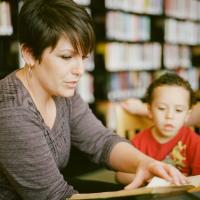For many children the most rewarding hour of the week is the time spent in after-school programs, clubs, and activities. This hour can be especially important for children who struggle in school. Outside activities help them build self-esteem in areas of strength. Some enjoy sports, some music lessons and performing; others, the joy of group activities like the scouts or Sunday school.
Approximately 2-5% of children in such youth activities are children with specific learning disabilities (LD) and/or Attention-deficit/Hyperactivity (ADHD) disorder. Many experts say this is a low estimate.
Children with LD and/or ADHD are intelligent. Children with LD have a difficulty processing and using information. They may have problems with reading, writing, or other academic skills areas. Children with ADHD are often impulsive and have a hard time staying on task. Since these disabilities are not “visible,” like a pair of glasses a child might wear, many do not understand what they are or how to work with children with LD and/or ADHD.
For children with LD and/or ADHD, however, after-school activities can be especially important. Children can select activities that let their strengths shine! These activities can quickly turn to frustration if the activity group leader is not aware of the child’s unique learning needs. To avoid this it is important for parents and volunteers directing after-school programs to work closely together.
Dr. Diane Painter, a former special education teacher who now directs a technology program at Deer Park Elementary School in Fairfax County, Virginia defined the issues. “All children want to learn and succeed.” She states that volunteers want to help children find success but they need strategies to help. Parents play an essential role. “Parents must first help their children become self-advocates.” Children must understand their disability so that they can help their teacher help them. This also enables them to know what works so they have strategies for later in life. Does a child learn best by doing, writing, listening or seeing?
Ruth Spodak, Ph.D., a special education consultant and psychologist practicing in Maryland, recently stated in a Washington Post article that families who seek ordinary activities for their children with disabilities “encounter everything from outright rejection to quick acceptance.” Often parents will volunteer to coach or direct a scout troop to give their child a chance to participate.
Parents can’t always volunteer. Working together volunteers and parents can help children with disabilities have a successful experience.
Here are some suggestions:
- Help your child understand his/her learning style -both strengths and weaknesses.
- Talk with the person who is leading the group. Discuss the behaviors the “coach” might see. Offer strategies that work. This is more important than the label. “Jimmy has difficulty following directions. He can become easily angry if he is asked to follow a list a directions. He does very well if directions are broken down into smaller steps or if he is given a written list of things to do that he can follow.”
- Work together to catch your child being good. Learn 80 Ways to say “Very Good.”
- Select activities carefully. A child who has a visual-motor problem, for example, will struggle on a soccer team of the coach who is working towards the state championship and who cannot tolerate errors. Find a team that really gives all children a chance to play.
- Be interested in your child’s progress but not overbearing. Ask the coach for specific ways you can help at home.
- Consistently offer your child a sincere and reasonable expectation that s/he can participate in the group activity effectively.
- Increase availability of information about LD and/or ADHD in your local programs training. You could ask a local special education teacher to present a workshop at the beginning training session for the program leaders. You could write a short story for the team newsletter or create a newsletter if one does not exist.
- Share information about other sources of information about LD and ADHD.
About the Author: Kathleen Ross-Kidder, Ph.D. was former Director of LD OnLine (www.LDOnLine.org), the interactive guide to learning disabilities for parents, teachers and other professionals, and the leading Web site in its field. LD OnLine is a service of WETA-TV-FM, the public broadcasting station in Washington, D.C. Dr. Ross-Kidder is also a faculty member of the Department of Psychology at The George Washington University, a former teacher in both private and public education and a licensed school psychologist who has worked extensively in public education and private practice helping children with learning disabilities and/or ADHD and their parents.
